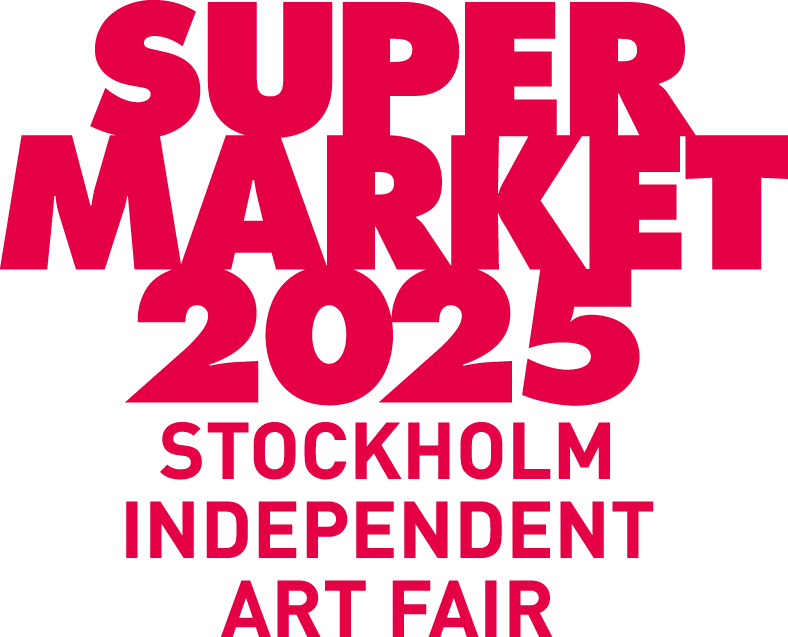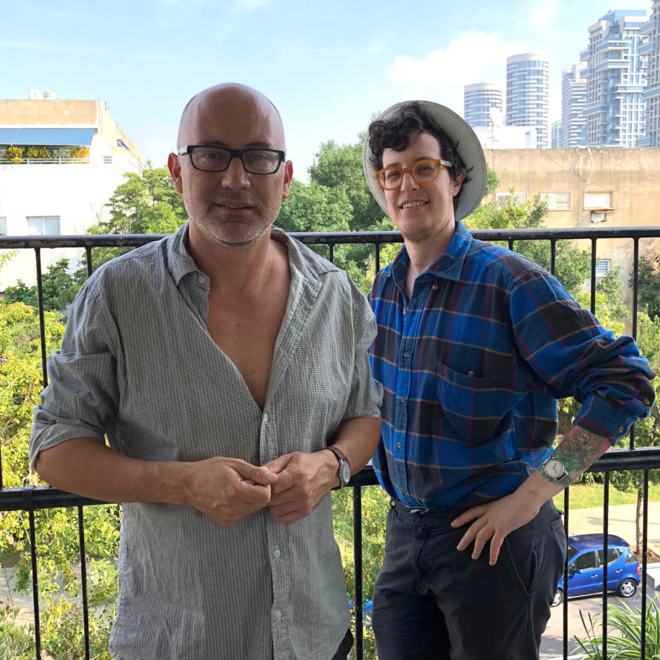Breakfast with Oree Holban & Elyasaf Kowner
During Supermarket 2018, Oree Holban’s colourful toy store ‘Boys “R” Girls’ lit up Nulobaz cooperative gallery’s exhibition booth, displaying the delicate balance between playfulness and austerity in gender transgressive art. For Supermarket 2019 (4–7 April), Nulobaz cooperative gallery once more presents a strong narrative with featured artists Elyasaf Kowner, Avi Levin and Rakefet Viner Omer who is returning again after having contributed to ‘Boys “R” Girls’ in 2018. This time they are joining together in the spirit of Josef Kowner (b. 1895) a prolific painter and holocaust survivor, who immigrated to Sweden after WWII.
While exploring Israel this winter, our press officer Felicia Gränd had breakfast with Oree Holban and Elyasaf Kowner on a sunny November morning in Tel Aviv – and seized the opportunity to ask a few questions.
Oree Holban:
1. Having taken part in Supermarket nearly a year ago now, what are your reflections today?
I think it was a wonderful opportunity to exhibit a project I had been dreaming of for a long time. I love the fact that it was in Sweden; it feels like a perfect place to initiate the first transgender toy store! But most of all I feel grateful to have had generous, funny and moving encounters with people – be it the staff at Supermarket, the participants, the visitors or just random people in the city of Stockholm.
2. Do you have any general thoughts on the format of the art fair? As a means for personal exposure, but also as an important artistic hub?
Perhaps more site-specific installations, or works that ‘take over’, spread across or in-between the various spaces, so that it is more like one big continuous immersive artwork, rather than the typical art fair white cube ‘boxes’.
3. Tel Aviv is a city that has a lot to offer to those looking to indulge in cultural activities. Are there any highlights especially relevant for art lovers that you would like to pinpoint?
Well, I guess I can not beat social media to that. But I would try to look at museums, galleries and music shows that are outside of Tel Aviv, because it's cool to travel and discover rural areas. Sure it can be fun to indulge and consume art in the city, but best is if one can combine it with some invaluable fresh air in nature.
4. Finally, the next edition of Supermarket revolves around the theme of ’Temporary Moratorium’ and subjects shrouded in taboo. What do you think is controversial in contemporary art? If anything?
Delivering a message without falling into self-judgment, sarcasm or fake ‘new age’ smiles. It might even be about being happy, peaceful and innocent. :)
Elyasaf Kowner:
1. Your artistic practice centers around concepts such as transformation and the impact of creativity across the globe. With that in mind do you think there are more or less successful recipes for cultural exchange?
People tend to be very judgemental and I think that the basic ingredients in the recipe for cultural exchange are trust, kindness and respect for others. I have created art in NYC, The Hague, Tokyo and Munich but making art together with a fellow artist from Beirut and exhibiting it in Israel made a real difference in the scope of my existence and made me a better person.
2. Josef Kowner was not only a holocaust survivor and productive painter, but also your great-uncle. Has he served as an inspiration for your own art practice to some extent?
The question of what I leave after I'm gone has been following me my whole life. It is only now, sitting with Maya in Zorik café that I understand the connection between this question and my great uncle Josef. I've never met him because he passed away in 1967 which was three years before I was born. My parents named me after my grandfather, Eljasz Kowner, and his brother, Josef Kowner. They found a biblical name from the book of Numbers that contains both names within it. My grandfather did not survive the holocaust whereas his brother did survive. At my parents house hangs a self portrait that Josef painted during the time of Lodz ghetto. This portrait inspired me to become an artist. With the joy of art comes a deep sense of guilt and a strange notion of absence – what is art all about? What is the meaning of human interaction?
3. What are your expectations as we are slowly moving closer to Supermarket 2019?
I turned to art because I was seeking answers to questions related to human existence. In reality, creating art and living this sort of life can become a burden instead of a solution. I expect to represent Nulobaz gallery together with my artist peers. Hoping to find a flow of energy, meet beautiful people and experience bonding and connection between other souls that chose to walk the path of creativity. Let’s drink a toast to this wonderful celebration of art.
4. Finally, the next edition of Supermarket revolves around the theme of ’Temporary Moratorium’ and subjects shrouded in taboo. What do you think is controversial in contemporary art? If anything?
Anything and any subject could be controversial once we depart from shallow stereotypes and instead dig deep. The fuss around celebrities in mainstream media creates false identities. Let's accept that all of us are celebrities and at the same time observe the human facets in famous people's lives. Accepting yourself as celebrity even if nobody cares or knows about you, even if you are not hip or just an artist whose work is all over the place. Yes, it's true – the taboo is inside me and I must release it.

